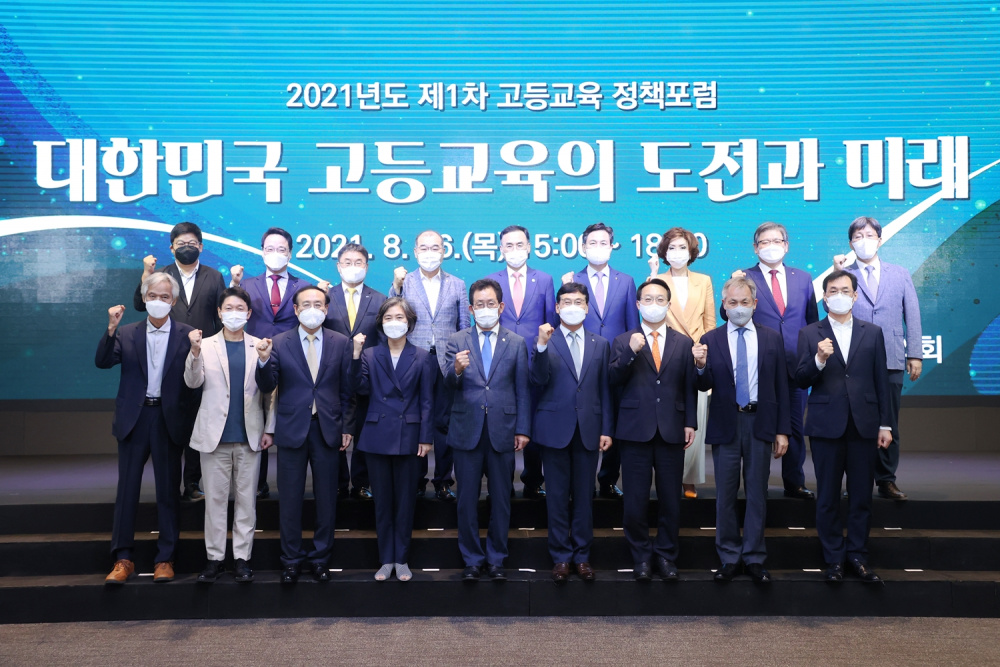National University 10 urges government to new education policies for future
· Writer : Jeju National University ·Date : 2021-09-13 00:00:00 ·View : 32
-
noImage
“정부+대학 위원회 구성, 미래교육 ‘새판’ 설계해야”
National University 10 urges government to new education policies for future NU10 presidents hold 1st Tertiary Education Policy Forum

The Presidential Council of National University 10 (NU10), a state-level association of South Korea’s key national universities, held its 1st Tertiary Education Policy Forum in the 2021 academic year on Thursday (Aug. 26).
The presidents of NU10 met in Yeouido, Seoul, to discuss “The Challenges and Future of South Korea’s Tertiary Education”.
The forum, prepared by Chonnam National University, explored responsive and adaptive measures to the ongoing COVID-19 pandemic, decreasing population, and fourth industrial revolution.
Yoo Eun-hye, Deputy Prime Minister and Minister of Education, said in her written message that a paradigm shift is needed in tertiary education for the universities to serve as a driving force of national development.
Yoo admitted that the recent crises that local colleges have faced are the result of complicated factors, which can hardly be addressed by the colleges alone. The national government will provide full support for on- and off-campus cooperation and autonomous innovation of universities by securing more budget and reducing regulations.
Song Ho-keun, chair professor at Pohang University of Sciece and Technology, said in his presentation criticized the attitudes of universities, describing the National Universities as “blinded elephants”, the Tech Universities as “one-eyed rhinos”, and the private universities as “polar bears on melting glaciers”.
In his proposal for national universities’ restructuring, Song stressed that science and tech majors need to specialize by region, while humanities need to be based on division of labor and cooperation. Specifically, he envisioned that Chucheongnamdo specializes in ICT, biotechnology, and chemistry, Gyeongsangnamdo in artificial intelligence, shipbuilding, automobiles, and robots, and Jeollabukdo in computer engineering and logistics. For humanities majors, he shared a strategy of “global studies”, suggesting Russian studies for Gangwondo, Southeast Asian studies for Jeollanamdo, Japan and worlds’ islands studies for Busan, and Austrian and New Zealand studies for Jejudo.
Additionally, the education specialist advised the national universities in the 21st century to have the basic rules of prior adjustment, autonomy, accountability, and collaboration, while the Ministry of Education takes the responsibility of supportive regulations.
The second speaker was Cho Youngtae, professor at Seoul National University, whose speech featured a demographic perspective of key national universities’ survival strategies. Cho pointed out that the recent crises in the universities’ ecosystem were predicted a decade ago. As the national and local universities have ignored the warning signal, they were destined to suffer.
Cho called for the constitution of a committee led not just by the Ministry of Education but also by different universities. By 203 at the latest, the committee has to design a new college ecosystem for the whole country, he suggested. He emphasized that the new ecosystem would decide the fostering of future-oriented talent and the survival of local areas.
Following the speeches, a panel discussion session was held, featuring Kang Minjung (lawmakers, Open Democratic Party), Kim Heon-young (president, Kangwon National University), Kwon Soon-ki (president, Gyeongsang National University), and Cha Jeong-in (president, Pusan National University).












 예비대학생
예비대학생 재학생
재학생 졸업생
졸업생 일반인
일반인 교직원
교직원